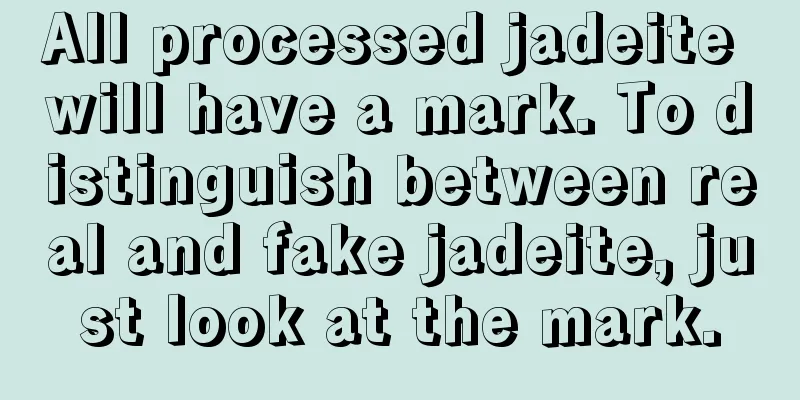Master these jade identification tips

|
Common jade identification methods are nothing more than starting with the aspects of "quality, water, color, and workmanship". In fact, in addition to these major basic aspects, there are also some tips to help you identify jade when purchasing. 1. Knocking sound Gently hit the two bracelets together. Be careful to be gentle, gentle, and gentle (Important things must be said three times). If you hit too hard, there may be no consequences... Natural jade will make a clear "clang" sound. The impact sound of B-grade jadeite with obvious fillings will be dull and not so clear. 2. Reticulated Jade washed with strong acid generally has obvious pores and reticular structures. Although stress and weathering can produce obvious pores and reticular structures in natural jade, these natural pores can be filled with later zeolite, clay minerals, etc., and may also be filled with mineral powder or polishing powder during the cutting, grinding and polishing process. Products with these fillers are not B-grade products and are easy to identify. 3. Classification of Jadeite Grades On the premise that the jade pieces being appraised are natural jade, they are divided into grades and price categories according to the 5C2T standard: composition, color, clarity, cut, weight, transparency, and texture. When buying jadeite, you can pay attention to these aspects as a measure of whether the price is appropriate. 4. Jade identification certificate The appraisal certificate can be said to be the most convincing reassurance in the jade industry. Even if some jades are real, but the density of their internal structure does not meet the standards, it is impossible to issue a certificate. Therefore, the credibility of jade identification certificates is still very high. Generally, the appraisal certificate of natural jadeite (grade A) will be marked with "Jade", "Natural Jade", "Jade (grade A)", "Jade (natural)", etc., while grade B and C jadeite will all be marked with "Jade (processed)" or "Jade (optimized)". The appraisal certificates issued by various institutions are credible, but there are also unscrupulous businessmen who will issue forged appraisal certificates, or real certificates with fake jade. Therefore, when you buy jadeite, even if the merchant has issued an appraisal certificate, you must carefully distinguish the authenticity of the certificate, whether the certificate and the jade are consistent, etc., before you can buy it with confidence. fcgc66 fcpf18 |
<<: Experts teach you how to choose jade
>>: Tips for selecting jadeite rough stones
Recommend
Is it true that jade is divided into “first goods” and “last goods”? Not a seasoned expert can understand it.
For beginners of jade, the first difficulty they ...
Teach you how to distinguish B and C grade jadeite
Today I would like to tell you one of the most im...
Yellow jade is dignified and noble, who can compete with it?
Yellow jadeite is one of the many colors of jadei...
Eight tips to help you choose a jade ring
The first ring was created two thousand years ago...
Machine carving and manual carving in jadeite carving
When we walk into some shops selling jadeite, we ...
How to choose a jade ruyi?
1. Jadeite germplasm This jade Ruyi is transparen...
A plump emerald three-legged golden toad with a copper coin in its mouth!
The Golden Toad is said to be the daughter of the...
Why does jade become greener the more you wear it?
Anyone who has bought jewelry and wears it freque...
Jade carving art - why every wealthy family has jade ornaments
Jade ornaments are a large category of jade acces...
Which methods of identifying jadeite are not advisable?
These identification methods are not advisable. I...
When choosing jadeite, how do you judge the color correctly?
For jadeite, color equals its value. The price di...
How do you usually identify the authenticity of jade? Don’t use these 5 wrong methods
Today's jade market is full of mixed goods an...
What does truly beautiful jade look like in the eyes of the Japanese?
September 2016, Japan Mineral Research Associatio...
Don’t know how to choose jade? A comprehensive analysis of the value of jadeite! Let you understand jade better!
When talking about jadeite now, you should no lon...
Weird jade rumors: Is it okay to wear B-grade jade?
A-grade jade is so expensive, is it okay to wear ...









